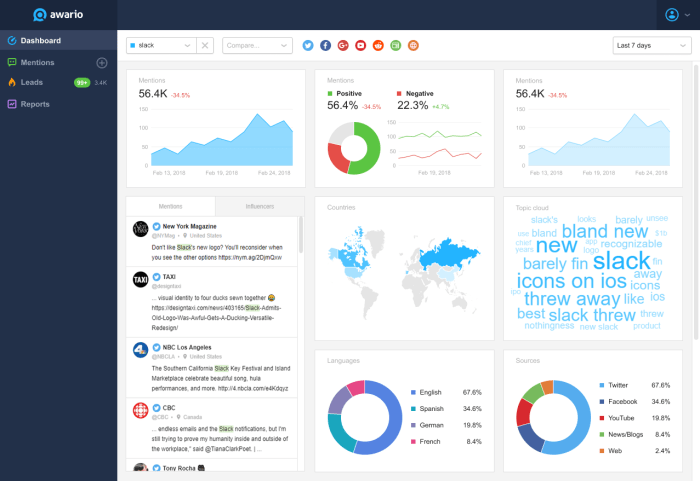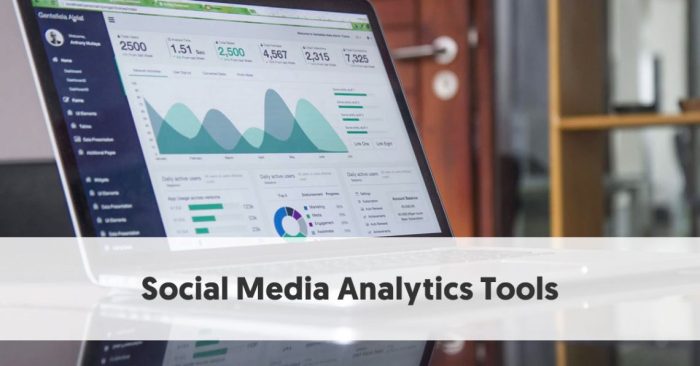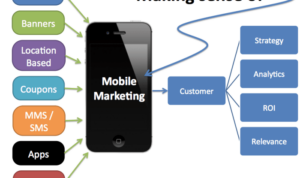Kicking off with Using Social Media Analytics Tools, get ready to dive into the world of data-driven decision-making in the social media landscape. From understanding the basics to exploring advanced features, this topic will unlock the power of analytics tools for businesses in a whole new way.
Overview of Social Media Analytics Tools: Using Social Media Analytics Tools

Social media analytics tools are essential for businesses to track, measure, and analyze their social media performance. These tools provide valuable insights into audience behavior, engagement metrics, and overall impact of social media campaigns.
Importance of Using Analytics Tools for Businesses
Using social media analytics tools allows businesses to make data-driven decisions, optimize their social media strategies, and improve their ROI. By analyzing key metrics such as reach, engagement, and sentiment, businesses can better understand their target audience and tailor their content accordingly.
- Identifying trends and patterns in audience behavior
- Measuring the effectiveness of social media campaigns
- Monitoring brand reputation and sentiment
Benefits of Leveraging Social Media Analytics Tools, Using Social Media Analytics Tools
Social media analytics tools offer a wide range of benefits, including real-time monitoring, competitor analysis, and performance tracking. These tools help businesses stay ahead of the curve and adapt to changing market trends.
- Real-time insights into audience engagement
- Competitor benchmarking and analysis
- Tracking key performance indicators (KPIs) for social media campaigns
Examples of Popular Analytics Tools
There are several popular social media analytics tools used in the industry, each offering unique features and capabilities. Some common examples include:
Sprout Social: A comprehensive social media management platform that offers in-depth analytics and reporting features.
Hootsuite: A popular tool for scheduling posts, monitoring social media conversations, and analyzing performance metrics.
Google Analytics: While not specific to social media, Google Analytics can provide valuable insights into website traffic originating from social media platforms.
Types of Social Media Analytics Tools

In the realm of social media analytics, various tools serve different purposes to help businesses understand their online presence better. Let’s explore the different types of social media analytics tools and their significance.
Listening, Monitoring, and Reporting Tools
- Listening Tools: These tools focus on tracking conversations online, including mentions of a brand, product, or . They help businesses understand what people are saying about them in real-time.
- Monitoring Tools: Monitoring tools go a step further by analyzing trends, patterns, and behaviors in social media conversations. They provide valuable insights into consumer preferences and sentiments.
- Reporting Tools: Reporting tools help businesses compile and present data in a structured format. They allow for the visualization of key metrics and performance indicators, making it easier to track progress and make data-driven decisions.
Real-Time Analytics Tools
Real-time analytics tools are crucial for businesses that need to respond quickly to online trends and events. These tools provide instant insights into social media activity, allowing companies to capitalize on opportunities and address issues promptly.
Sentiment Analysis Tools
Sentiment analysis tools use natural language processing and machine learning algorithms to determine the sentiment behind social media posts. By analyzing whether a post is positive, negative, or neutral, businesses can gauge public opinion and tailor their marketing strategies accordingly.
Competitive Analysis Tools
Competitive analysis tools help businesses benchmark their performance against competitors on social media. These tools provide insights into what strategies other companies are using, their engagement levels, and overall market positioning. By understanding the competitive landscape, businesses can identify opportunities for growth and improvement.
Key Features to Look for in Social Media Analytics Tools
When selecting a social media analytics tool, it is crucial to consider key features that can help you effectively analyze and optimize your social media performance.
Data Visualization Capabilities
- Tools with data visualization capabilities can help you easily interpret complex data and trends.
- Visual representations such as graphs, charts, and heatmaps can provide valuable insights at a glance.
- Look for tools that offer customizable dashboards for real-time monitoring and analysis.
Sentiment Analysis
- Sentiment analysis allows you to gauge the sentiment (positive, negative, neutral) of conversations around your brand or industry.
- Understanding sentiment can help you tailor your content and engagement strategies accordingly.
- Tools that provide sentiment analysis can help you measure the impact of your social media campaigns.
Influencer Tracking
- Identifying and tracking influencers in your industry can help you leverage their reach and credibility.
- Tools that offer influencer tracking can help you identify key influencers and engage with them effectively.
- Collaborating with influencers can amplify your brand’s visibility and credibility on social media platforms.
Engagement Metrics
- Engagement metrics such as likes, shares, comments, and mentions are crucial for measuring the impact of your social media content.
- Tools that provide detailed engagement metrics can help you understand what type of content resonates with your audience.
- Analyzing engagement metrics can guide your content strategy and drive better results on social media.
Best Practices for Using Social Media Analytics Tools
In order to make the most out of social media analytics tools, it is essential to follow best practices that can help in setting measurable goals, ensuring data accuracy, benchmarking, and interpreting insights effectively.
Setting Measurable Goals for Analytics
- Define specific objectives that you want to achieve through social media analytics.
- Ensure that your goals are measurable, realistic, and aligned with your overall marketing strategy.
- Track key performance indicators (KPIs) that are relevant to your goals.
The Significance of Data Accuracy and Reliability
- Verify the data sources used by the social media analytics tools to ensure accuracy.
- Regularly monitor and update data to maintain reliability over time.
- Use multiple tools or cross-check data to validate insights and avoid errors.
The Importance of Benchmarking in Social Media Analytics
- Compare your performance metrics with industry standards or competitors to identify areas for improvement.
- Set benchmarks based on historical data to track progress and measure success.
- Use benchmarking to set realistic targets and evaluate the effectiveness of your social media strategies.
Strategies for Interpreting and Acting Upon Analytics Insights
- Look for trends and patterns in the data to identify opportunities for growth.
- Segment your audience based on analytics insights to tailor your content and messaging.
- Experiment with different strategies based on data findings and measure the impact on your goals.












